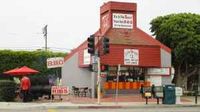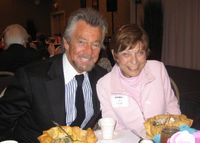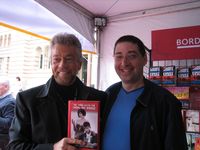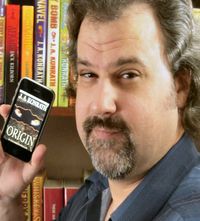My friend Steve Cannell died yesterday. He was a great writer and an incredibly nice man.
It always amazed me that a man as successful as he was could come across as such a regular guy. I'd known him for years but he had the remarkable ability to make even someone he'd just met feel like his oldest friend.
I think I captured my feelings and memories of Steve best in the following essay, which I originally posted here in January 2009.
==================================================================
 Every time I do a signing with Steve Cannell, it's reliving a dream. I grew up admiring him and his writing on shows like THE ROCKFORD FILES and THE A-TEAM…and I dreamed of working for him someday. He had the career that I wanted…and the talent, too. I didn't think that working with him was a real possibility but I knew I could learn from him anyway.
Every time I do a signing with Steve Cannell, it's reliving a dream. I grew up admiring him and his writing on shows like THE ROCKFORD FILES and THE A-TEAM…and I dreamed of working for him someday. He had the career that I wanted…and the talent, too. I didn't think that working with him was a real possibility but I knew I could learn from him anyway.
While I was in high school, I covered the television business for The Contra Costa Times (in Walnut Creek, CA) and came up with lots of excuses to do phone interviews with him, never once revealing that I was only 16-years-old or that I had any desire to be a TV writer. I know he liked the articles that I wrote because he told me so…and, more importantly, he never failed to return a call and was always available for a quote if I needed one.
I was still freelancing for the newspaper…and for a number of other publications…when I went down to Los Angeles to attend UCLA. I called him for an article about TENSPEED AND BROWNSHOE (or was it GREATEST AMERICAN HERO?) and I must have mentioned that I'd moved to L.A. because he invited me to his office at Samuel Goldwyn Studios. I was terrified. I was sure that once he saw I was a kid, he'd think I was a fraud and never talk to me again. But I couldn't resist the opportunity to actually meet him.
He did look shocked when I walked in the door, and I think for a moment he was afraid I was going to pitch him for a script, but I started off with a tough question about his decision to go into business for himself and the interview went great after that. Whatever awkwardness either one of us felt quickly evaporated and we talked for a couple of hours. (I know now, after talking with him about that day, that I proved to him with that question that I was a serious journalist and not someone who'd been running a long scam to get into his office). It was a wide-ranging interview about the business, about the risks he was taking leaving Universal, and it was one of the best interviews I'd ever done. In fact, it was one of the clips that got me a job as a reporter for Newsweek.
I interviewed him many more times over the years for various articles for a bunch of publications (the best was a huge profile in the trade magazine Electronic Media, now know as Television Week). I eventually gave up reporting and, through a lucky break, become a TV writer with William Rabkin. We sold a few freelance scripts and then got offered our first staff job… on HUNTER, a Stephen J. Cannell Production. It was fate.
Unfortunately, by that point, Steve had a "hands off" relationship with the show, which was then being run by Fred Dryer and Marv Kupfer. Even so, I'll never forget the fantastic feeling the first day I walked into the Stephen J. Cannell Productions building as one of the writers instead of a reporter. It was amazing. A day or two later, I ran into Steve in the hallway. He thought I was there for an interview and he started to apologize for forgetting the appointment…I was thrilled to tell him that no, I wasn't there for an interview…I was working for him. He smiled and gave me a hug.
Sadly, because of the situation at HUNTER, I didn't actually work with Steve at all…I only bumped into him now and then. The job also didn't last long …. we ended up quitting and getting hired onto BAYWATCH…but that's another story.
The HUNTER experience didn't tarnish my relationship with Steve at all. We saw each other at industry events and he was always amazingly friendly. And as it turned out, a few years later I was back at Cannell again as a supervising producer on the syndicated series COBRA and, much to my pleasure, I actually got to work closely with him this time. He also used to pop into my office to share bits and pieces of a novel he was working on….which became THE PLAN.
We've remained friends ever since – and have signed together and spoken on panels with each other many times in many cities over the years. (Bill & I even had the amazing thrill of
hiring him as an actor in a script
we wrote for DIAGNOSIS MURDER…he played a burned-out TV producer of action shows…
who becomes an actor!). But every time we get together, I am reminded how lucky I am to have achieved one of my dreams and to be able to count Steve among my friends. I hope the thrill never dies.
============
UPDATE: My brother Tod has written a great post about his experiences with Steve.








